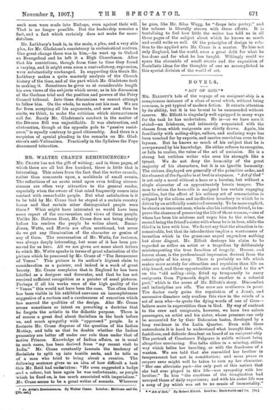MR. WALTER CRANE'S REMINISCENCES.* Mn. Cnasrp has not the gift
of writing; and in these pages, of which there are all but five hundred, there is little that is interesting. This arises from the fact that the writer records, rather than comments upon, a multitude of small events. The reflections of an acute mind upon even trifling circum- stances are often very attractive to the general reader, especially when the owner of that mind frequently comes into contact with remarkable people. But what satisfaction is it to be told by Mr. Crane that he stayed at a certain country house and that certain other distinguished people were there ? What might have interested us would have been some report of the conversation and views of these people. Unlike Mr. Holman Hunt, Mr. Crane does not bring clearly before his readers the people he writes about. Burne- Jones, Watts, and Morris are often mentioned, but never do we get any illumination of the character or genius of any of them. The conversation of Mr. Watts, for instance, was always deeply interesting, but none of it has been pre- served for us here. All we are given are some short letters in which Mr. Watts speaks in terms of great admiration of the picture which he possessed by Mr. Crane of "The Renascence of Venus." This picture is its author's highest claim to consideration as a painter, and indeed is a work of great beauty. Mr. Crane complains that in England he has been labelled as a designer and decorator, and that he has not received sufficient recognition as a painter of easel pictures. Perhaps if all his works were of the high quality of the "Venus" this would not have been the case. Too often there has been visible in his exhibited canvases an incompleteness suggestive of a cartoon and a carelessness of execution which has marred the qualities of the design. Also Mr. Crane seems sometimes so intent on preaching a doctrine that he forgets the artistic in the didactic purpose. There is of course a great deal about Socialism in the book before us, and much sympathy with " oppressed " people. In a footnote Mr. Crane disposes of the question of the Indian Mutiny, and tells us that he doubts ,whether the Indian peasantry are better off under our rule than under that of :native Princes. Knowledge of Indian affairs, as is usual in such cases, has been derived from "my recent visit to India." Mr. Crane constantly laments the tendency of :Socialists to split up into hostile seats, and he tells us of a man who tried to bring about a reunion. The following sentence gives us an idea of how difficult a task 'this Mr. Reid had undertaken: "Ho even suggested a badge .and a colour, but here again he was unfortunate; as purple which he fixed on, is too much associated with imperialism." _Mr. Crane seems to be a great writer of sonnets. Wherever
• As Artist's Bectiainvacra. By Walter Crane. London: Methuen and Co. alhz. net]
he goes, like Mr. Silas Wegg, he "drops into poetry," and the volume is liberally strewn with these efforts. It is tantalising to feel how little the writer has told us in all these pages of the subject about which he knows so much and could write so well. Of the principles of design in rela- tion to the applied arts Mr. Crane is a master. To him not only England, but the world, owes a great debt for what he has done and for what he has taught. Willingly could we spare the chronicle of small events and the exposition of Socialistic ideas for the thoughts of one so accomplished in this special division of the world of art.






























































 Previous page
Previous page